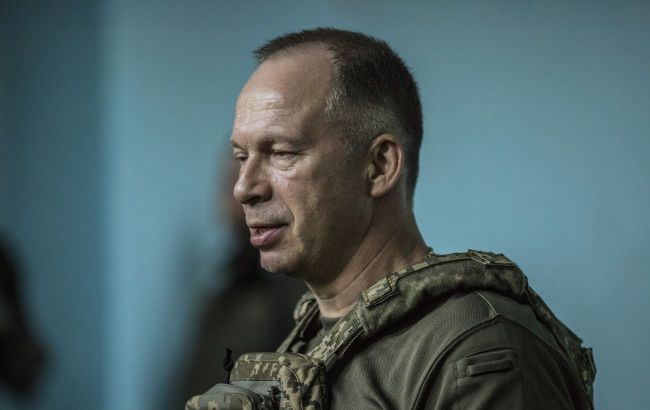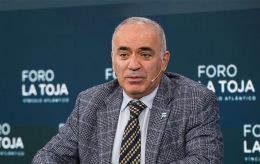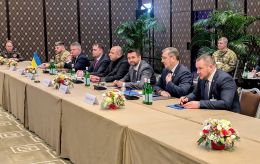Victory, returning Crimea, mobilization - Key takeaways from Syrskyi's interview with The Guardian
 Oleksandr Syrskyi, Commander-in-Chief of the Armed Forces of Ukraine (Photo: Getty Images)
Oleksandr Syrskyi, Commander-in-Chief of the Armed Forces of Ukraine (Photo: Getty Images)
Ukrainian Armed Forces Commander-in-Chief Oleksandr Syrskyi gave an interview to the British daily newspaper The Guardian, in which he discussed mobilization, the balance of forces on the battlefield, losses on both sides, the plan to retake Crimea, Ukraine's victory, and returning to the 1991 borders.
Key points from the Commander-in-Chief's interview about the war - in the RBC-Ukraine material.
On F-16 fighters
The Commander-in-Chief declined to answer questions about when the long-awaited delivery of F-16 fighters to Ukraine would take place. He did not give a direct answer to whether it might happen this week or in August.
"I know (when the F-16s will arrive in Ukraine - ed.). But I can't tell you about it, unfortunately," journalists quoted Syrskyi.
According to The Guardian, despite skepticism about Ukraine's prospects for an absolute victory, Syrskyi noted various positive developments. The F-16s would strengthen Ukraine's air defense, enable Kyiv to counter Russian cruise missiles, and more effectively hit ground targets.
However, the Commander-in-Chief emphasized that there are limits to the capabilities of these fighters. Syrskyi said that F-16s would approach no closer than 40 km to the front to avoid being shot down by the Russians.
Ratio of Ukraine's and Russian forces
According to journalists, Syrskyi acknowledges that the Russians have much better resources. He mentioned that the enemy has more tanks, BMPs, and soldiers.
According to the Commander-in-Chief, Russia had 100,000 soldiers at the beginning of the invasion; now, this number has grown to 520,000, and by the end of 2024, it will be 690,000.
Also, since 2022, Russian tanks have doubled - from 1,700 to 3,500, artillery systems have tripled, and armored personnel carriers have increased from 4,500 to 8,900 units.
"When it comes to equipment, there is a ratio of 1:2 or 1:3 in their favor," he said. Since 2022 the number of Russian tanks has "doubled" – from 1,700 to 3,500. Artillery systems have tripled, and armored personnel carriers gone up from 4,500 to 8,900. "The enemy has a significant advantage in force and resources," Syrskyi said.
If Russia launches another assault in Zaporizhzhia region, "we can give them a good response"
The Guardian noted that the Commander-in-Chief says that the situation is "very difficult."
"The Russian aggressor attacks our positions in many directions," he said. Could Russia's advance be halted? "Yes, of course. First of all, it depends on our brave soldiers, our officers," he said, adding that often resilient and heroic Ukrainian units have defeated larger enemy groups.
He cited Russia's recent attempt to capture Kharkiv and the neighboring Sumy region. He stated that the enemy "failed" despite the ongoing battles. The Commander-in-Chief said that Russian dictator Vladimir Putin's attempt to create a so-called "security corridor" near the border, particularly near the Belgorod region, was thwarted.
When asked about rumors that Moscow plans another assault in the southern Zaporizhzhia region, he replied affirmatively: If this happens, "we can give them (the Russian troops - ed.) a good response."
Front line length - 3,700 km
The Commander-in-Chief described Russia's creeping victories as "tactical" - local achievements rather than an "operational" breakthrough, such as capturing a major city.
"In principle, the enemy has not made any significant progress," he stated.
According to Syrskyi, the length of the front line is 3,700 km. At the same time, active combat operations are ongoing along a 977 km section, which is "twice the length of the border between Germany and France."
On Ukraine and Russia's losses
As the Commander-in-Chief emphasized, Kremlin losses are three times higher than Ukrainian losses and, on certain fronts, "even more."
"Their number of killed is much bigger," Syrskyi emphasized.
The agency recalled a statement from February by President Volodymyr Zelenskyy, who at that time said that the number of killed Ukrainian soldiers was 31,000. When asked if the Commander-in-Chief could update the data, he refused, calling the topic "sensitive" and something Moscow could exploit.
Syrskyi compared his battlefield tactics with Russian commanders, who are known for sacrificing huge numbers of infantry to advance 100-200 meters.
"It's very important for us to save the lives of our soldiers. We don't defend ruins to the death," Syrskyi said, adding that he does not want to "achieve goals at any cost" or send his people into "futile meat assaults." For this reason, they sometimes had to retreat to more advantageous positions.
Ukrainian drones targeted "about 200 critical infrastructure sites" in Russia
The Guardian notes that Syrskyi said Russia had "superior aviation" and "very strong" air defense. Because of this, Ukraine increasingly uses drones. He noted that Ukraine uses drones "very effectively" and has tested robotic ground systems—ground robots that could deliver ammunition or evacuate a wounded soldier from the battlefield. In addition, the Armed Forces of Ukraine have introduced a new branch—the Drone Systems Forces.
"We fight not by quantity but quality," Syrskyi said, adding that drones play as significant a role as artillery.
According to the Commander-in-Chief, the Armed Forces of Ukraine have successfully used long-range kamikaze drones to strike deep into Russia, targeting about 200 Russian critical infrastructure objects. Syrskyi noted that all the targets were related to military logistics and included factories, fuel depots, and ammunition warehouses.
Meanwhile, naval drones, similar to speedboats, have sunk about a third of the Russian Black Sea Fleet. The Commander-in-Chief claims that for the Russians, this "really became a trap for them and for some [vessels] a grave." He emphasized that the aggressor was forced to completely withdraw from the Crimean port in Sevastopol after a series of Ukrainian attacks. Additionally, drone and missile strikes destroyed enemy radar and missile installations.
Deoccupation of Crimea and 1991 borders
The Guardian notes that a key goal for Ukraine is the destruction of the Kerch Strait Bridge and the railway crossing connecting the occupied peninsula with Russia. But when this might happen, Syrskyi refused to say. The agency recalls that two previous attempts included a truck bombing and a drone strike.
The General said that Kyiv had a plan to retake Crimea more than ten years after Putin illegally occupied it.
"It's realistic. Of course, it's a big military secret. We will do everything we can to reach the internationally recognized borders of 1991 [when Ukraine voted for independence from the USSR]. We have to win … to liberate our citizens who are in the occupied territories, who are suffering," Syrskyi noted.
The Commander-in-Chief also stated that Ukraine would win the war, and he knows how to achieve this.
"I know how I have to do it. And I'm sure that we will do it," the General said.
He told journalists that he does not sleep "many hours" and occasionally reads books on the history of Ukraine during his rest periods to "understand past processes." Syrskyi says that "we have brave people and a difficult history."
Mobilization in Ukraine
The Commander-in-Chief noted that he would be unable to create new reserves and brigades needed as Russia multiplies its ground forces without mobilization.
"It's very important for us that all citizens of Ukraine fulfill their constitutional duty," he said.
Syrskyi also called on Ukrainians living abroad to participate in resisting Russian aggression.
"I hope that after victory, they will be able to tell their children where they were. Where were you when all citizens of Ukraine were fighting in such fierce battles? That is the question," the General explained.
When asked how much time is left until Ukraine's victory in the war, Syrskyi said, " I think you have to be very, very brave to say when. We do everything to make it happen. There is simply no more important task for us," the Commander-in-Chief concluded.
In March 2024, Commander-in-Chief of the Armed Forces of Ukraine Oleksandr Syrskyi gave an interview in which he reported that the need to mobilize 500,000 soldiers had significantly decreased.
Earlier, in an interview with the German TV channel ZDF, the Commander-in-Chief spoke about the new stage of the war, the goal of Ukraine's defensive operation, and Russia's "meat assaults" on the front line.

